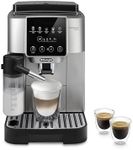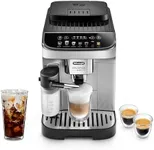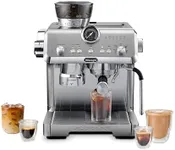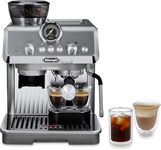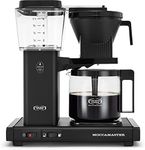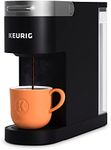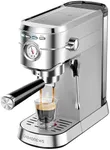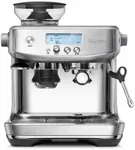Buying Guide for the Best Coffee Makers
Choosing the right coffee maker can make a big difference in your daily routine and enjoyment of coffee. With so many types and features available, it's important to think about how you like your coffee, how much you drink, and how much effort you want to put into making it. Understanding the key specifications will help you find a coffee maker that fits your lifestyle and preferences.Type of Coffee MakerThe type of coffee maker refers to the brewing method and design, such as drip, single-serve, espresso, French press, or pour-over. This is important because each type produces a different style of coffee and requires a different level of involvement from you. For example, drip machines are great for making multiple cups with minimal effort, while espresso machines offer strong, concentrated coffee but may need more skill. Single-serve machines are convenient for quick, individual cups, and manual methods like French press or pour-over give you more control over the brewing process. To pick the right type, think about how much coffee you drink, how much time you want to spend making it, and what kind of coffee you enjoy most.
CapacityCapacity means how much coffee the machine can make at one time, usually measured in cups or ounces. This is important because it determines whether the coffee maker can meet your needs, whether you’re brewing just for yourself or for a group. Small-capacity machines (1-2 cups) are ideal for individuals or occasional drinkers, medium (4-6 cups) suit couples or small families, and large (8-12 cups or more) are best for households with multiple coffee drinkers or for entertaining guests. Choose a capacity that matches your daily coffee habits and the number of people you usually serve.
Brewing TimeBrewing time is how long it takes for the coffee maker to prepare your coffee. This matters if you’re often in a hurry or if you like to savor the process. Fast-brewing machines can make coffee in a few minutes, which is great for busy mornings, while slower methods like French press or pour-over may take longer but can offer richer flavors. Consider how much time you have in the morning or during your coffee breaks, and pick a coffee maker that fits your schedule.
Ease of CleaningEase of cleaning refers to how simple it is to keep the coffee maker clean and ready for use. This is important because regular cleaning keeps your coffee tasting fresh and extends the life of the machine. Some coffee makers have dishwasher-safe parts or self-cleaning features, while others require more manual effort. If you prefer low-maintenance appliances, look for models with removable, easy-to-clean components. Think about how much time and effort you’re willing to spend on cleaning when making your choice.
Programmable FeaturesProgrammable features include options like setting a timer to start brewing automatically, adjusting brew strength, or keeping coffee warm after brewing. These features add convenience and customization to your coffee routine. If you like waking up to freshly brewed coffee or want to control the strength of your brew, look for machines with these options. Decide which features would make your mornings easier or your coffee more enjoyable, and prioritize them when choosing a coffee maker.
Filter TypeFilter type refers to whether the coffee maker uses paper filters, permanent mesh filters, or other systems. This affects both the taste of your coffee and the ongoing maintenance. Paper filters are easy to use and dispose of, but you’ll need to keep buying them. Permanent filters are reusable and eco-friendly, but require regular cleaning. Some people find that different filters affect the flavor and texture of the coffee. Consider your preference for convenience, taste, and environmental impact when choosing a filter type.
Size and FootprintSize and footprint describe how much space the coffee maker will take up on your counter or in your kitchen. This is important if you have limited space or want to keep your kitchen uncluttered. Compact models are great for small kitchens or offices, while larger machines may offer more features but need more room. Measure your available space and think about where you’ll place the coffee maker before making a decision.

